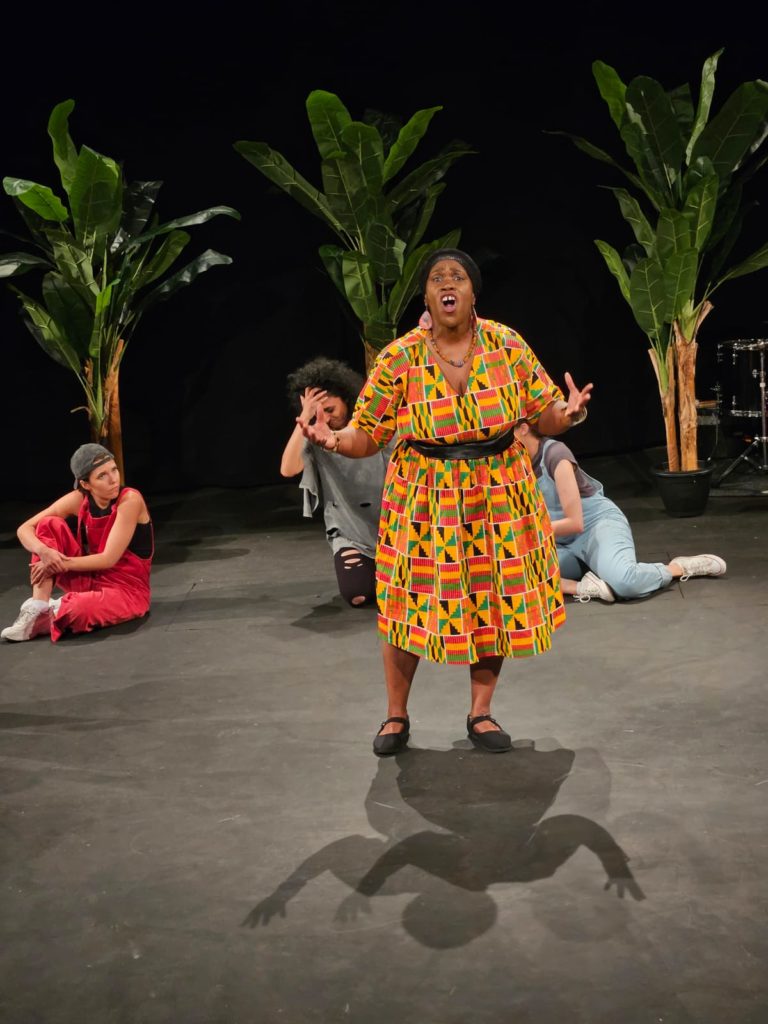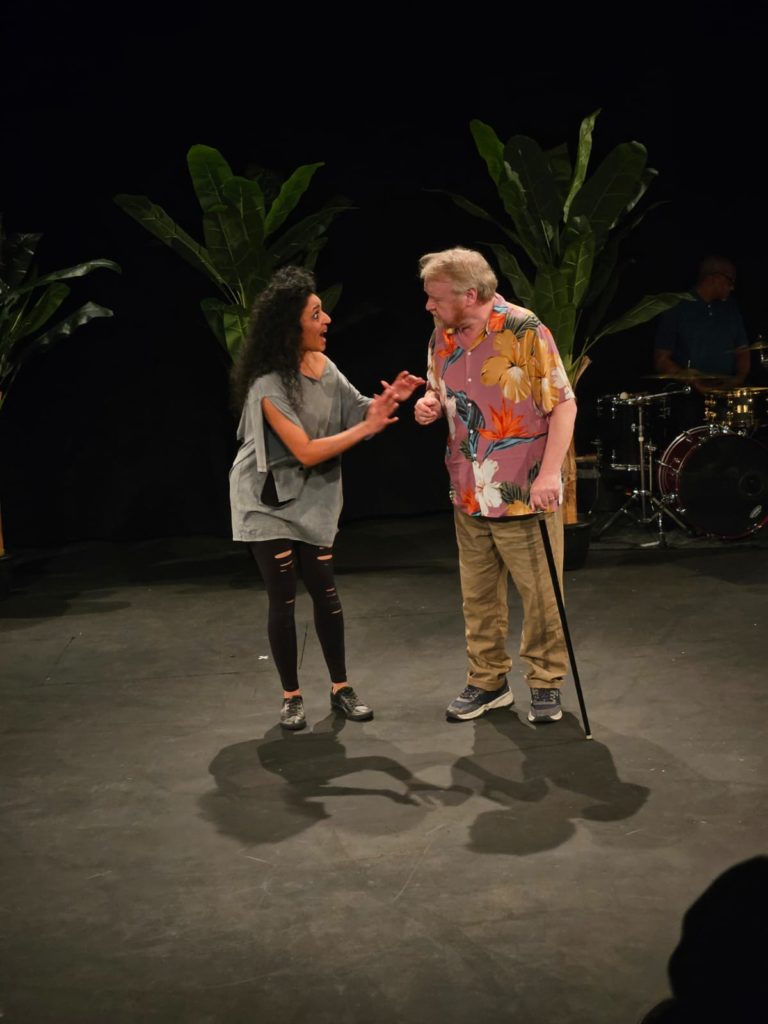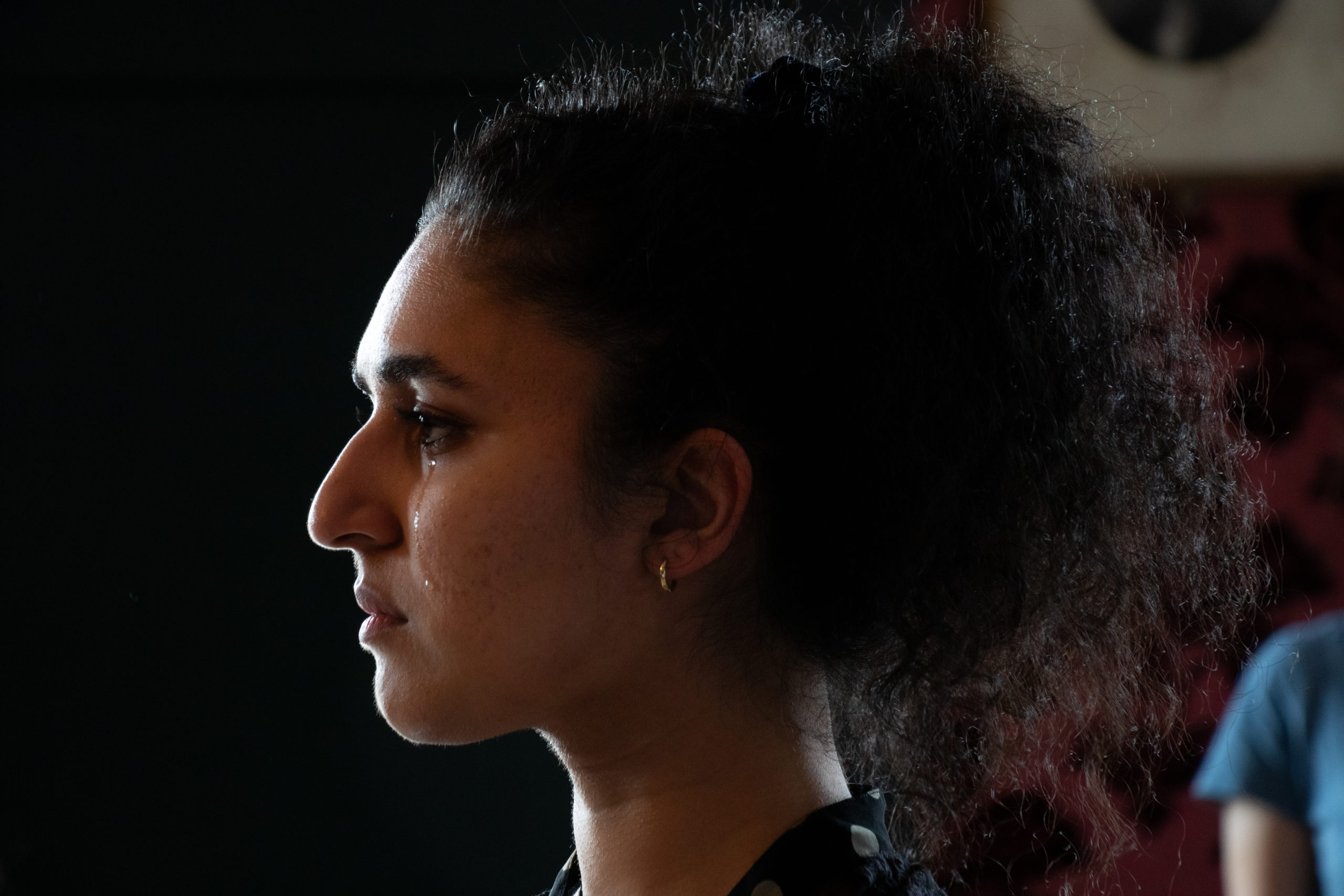Medea Gosperia – Thee Black Swan / The Cockpit Theatre, London
A new musical version of an ancient story, Medea Gosperia has some strong performances and likeable moments, but fails to come together as an overall concept.

Credit for lead image: Darien Charles.
Medea Gosperia
Back at the Cockpit Theatre! My first trip only happened recently, but I was tempted back by a unique take on an ancient tale in Medea Gosperia with libretto by Kay Hammond and vocal lines devised between the company and Sam Bergliter. The work of Thee Black Swan, Medea Gosperia tells Medea’s story through a blend of musical styles, from opera to jazz to gospel to lovers rock. But before we get into that, let’s take a quick step back.
Just in case there are gaps in your knowledge of Ancient Greek theatre (and you didn’t memorise my last review for some reason) let’s recap who Medea is. She (played by Natasha Agarwal) is the wife of Jason (Sandeep Gurrapadi). She is the sorceress and outsider who gave him the Golden Fleece – and murdered her brother – as an act of devotion. This transgressive act meant she could never go home. So when she is exiled from Corinth to clear the path for Jason to marry King Creon’s (Oscar Castellino) daughter Glauce (Livia Ledda), she is desperate. From there, let’s just say it doesn’t end well. It’s a proper Greek tragedy.
But this version, as we were saying, is told through music. It’s also shifted to the Caribbean but we will come back to that. Different characters bring with them their own music and therefore tone. The chorus, typically the local women but here with men too, start off formal but lighten up as they come around to Medea’s point of view. The Nurse (Amanda White), who came with Medea from her homeland, shows through music her continuing connection to that place. A connection we sense, also through music, that Medea has lost. Jason, meanwhile, is naturally a jazz guy: mercurial and unpredictable. But he’s more than happy to play along with Glauce’s romantic musical fantasy. It’s also a chilling contrast to hear Medea singing “I must think of my sons: a mother knows best” while the chorus, not understanding her intent, gleefully repeat it back to her.
The insights into the nature of the characters is the plus side of this musical interpretation. There are a couple of downsides, too. Firstly the collaborative process of creation has resulted in a work which is not quite cohesive, musically speaking. The constant switching between styles, often between one line and the next, can also be a lot to follow. Having said that, and after a little more reflection, it’s often the case for opera, too: different airs and tones for different characters and subplots. It’s just that it’s more overt here.

A Caribbean Twist, That Misses Some Beats
So back to the Caribbean setting for a moment. In this version, rather than Corinth and Colchis, we have Becouya/Bequia and Aloi. The programme informs us that these are Arawak names, and a further Google search reveals they are here and here. Bringing into this context has the potential to reinforce Medea’s othering in a way that is more meaningful to us today than the original classical setting. In a time of deep divisions, a story of who belongs or doesn’t, and who is alone or supported, certainly touches a nerve. However in practice, the shift in setting mostly manifests through the incorporation of reggae music and switches from oracles and gods to Obeah and Baron Samedi. I would have liked to see this angle more fully explored.
Looking now to the performances, I must highlight Agarwal as a standout. Although she is slightly stronger in despair than in murderous rage, she has powerful stage presence. I was impressed also by her voice. Her clear and rich tones are regal in the midst of the callousness and indifference her character faces. Also impressive are Castellino as Creon, and Ledda’s naive and hopeful Glauce. I also applaud the entire band, and would happily come to hear them at a jazz session any time.
Despite these many elements to appreciate, in summary I can’t help but think there’s something about Medea Gosperia that doesn’t quite come together. Like the last production I saw at the Cockpit this is partially in the swallowed lines of theatre in the round. The exposition of the story is mostly in the singing, so missing a line or two can be impactful. And not all voices in the company project well. But it’s also in the constantly shifting musical styles. In their best individual moments the performers seemed almost to be in their own productions. It needs a little more glue to hold it together as one piece.
Medea Gosperia is nonetheless an imaginative retelling, and an entertaining evening. Please note that two performers share the lead role, a detail you may want to check when selecting dates. And take your seats early to enjoy the band to the fullest.
Salterton Arts Review’s rating: 3/5
Medea Gosperia on until 20 July 2024. More info and tickets here.
Heading
Text
Trending
If you see this after your page is loaded completely, leafletJS files are missing.

